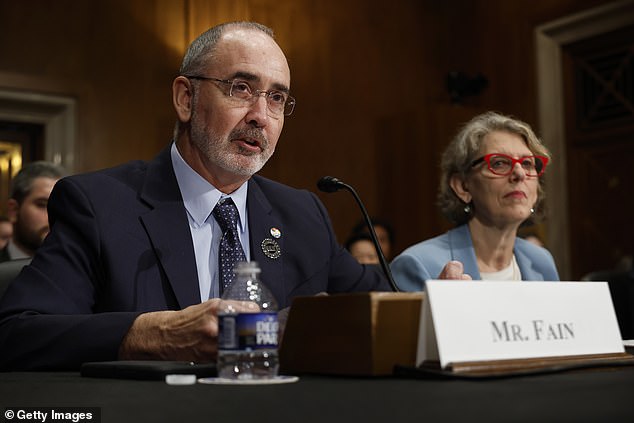Could America move to a four-day work week? Bernie Sanders is launching an effort to cut weekly hours for millions while taking home the same wages
Senator Bernie Sanders believes it is long past time for the United States to move away from a 40-hour workweek and adopt a standard 32-hour workweek without cutting workers’ wages.
The Vermont senator introduced legislation that would do just that. But his proposal is already facing strong opposition from the other side of the aisle.
The Thirty-Two Hour Workweek Act would reduce the standard workweek in the United States from 40 to 32 hours over four years, while preserving workers’ wages. It would also require time-and-a-half overtime pay for workdays longer than 8 hours and a doubling of overtime pay for workdays longer than 12 hours.
Sanders’ proposal was released ahead of a hearing by the Senate Health, Education, Labor and Pensions (HELP) Committee to consider a four-day work week.
According to Senator Sanders, the last time the Senate held a hearing to consider shortening the standard work week was in 1955, when Dwight D. Eisenhower was president.
“Today, almost seventy years later, despite a technological explosion as we all know, and a huge increase in worker productivity, nothing has changed,” Sanders said in his opening statement. ‘Think of the enormous transitions we have seen in the economy, but in terms of the working week nothing has changed.’
Senator Sanders during a Senate HELP Committee hearing on a 32-hour work week following the introduction of the 32-hour work week law

Ranking member Bill Cassidy denounced a mandatory 32-hour work week without pay cuts, claiming it would lead companies to move jobs overseas and increase inflation
The 40-hour work week was introduced in 1940 after Congress passed the Fair Labor Standards Act. It has been the standard ever since.
However, Sanders said that American workers are more than 400 percent more productive than they were 80 years ago, and that the United States has not kept pace with other countries.
“The sad reality is that Americans now work more hours than the residents of any other wealthy country.”
The progressive senator noted that in 2022, Americans worked 204 more hours per year than workers in Japan, 279 more hours than workers in Britain and 470 hours more than workers in Germany.
“Despite these long hours, the average worker in America earns almost $50 less a week than he did 50 years ago, after adjusting for inflation,” Sanders said.
“The question we’re asking today is a pretty simple one: Do we continue the trend of technology only benefiting the people at the top, or do we demand that these transformational changes benefit the people working?”
But Republicans did not welcome Sanders’ proposal with open arms. Ranking Member Bill Cassidy of Louisiana labeled the proposal “free money.”
“In reality, there is no such thing as a free lunch. It is the employees who would be paying, not getting paid extra,” Cassidy said.
Cassidy claimed that forcing companies to raise wages for fewer hours would “devastate some employers” and force them to buy jobs abroad, automate them to replace workers or raise prices amid the already tough inflation.
He said that if a company wants to introduce a 32-hour working week, it can go for it, but the government does not have to impose this.
“The government should not be in the business of undermining employers’ ability to keep their doors open with unreasonable and perhaps unconstitutional mandates,” Cassidy said.
He praised the US as the richest country in the world, noting that this was achieved thanks to the American work ethic.
“We will not maintain our status as the richest country in the world if we pressure the economy with something that claims to be good for the American worker, but will actually lead to the offshoring of jobs in search of cheaper labor,” he argued. he. .
Sanders’ proposal for a 32-hour work week is endorsed by several unions, including the AFL-CIO, UAW and SEIU. UAW President Shawn Fain was among those who testified before the committee Thursday.
“More profit is being squeezed out every hour, every minute and every second,” Fain said. “There was a time when this was supposed to result in employees getting their time back and part of their lives back.”
Fain denounced wealth inequality in the United States, saying Americans have had enough of it. He lambasted Wall Street, saying they are the “freeloaders” and “masters of passive income,” not blue-collar working Americans.

UAW President Fain and Dr. Schor testified before the Senate HELP Committee on Thursday

According to the ILO, American workers work an average of 38 hours per week, more than most European countries, Canada, Australia and Japan, but less than countries such as China and India
Another witness at Thursday’s hearing was Dr. Juliet Schor of Boston College, who has studied a four-day work week pilot program at companies in the United States, United Kingdom, Australia, Canada and Ireland.
Findings from the initial surveys show that almost 33 companies have reported high levels of satisfaction among both employers and employees with the four-day working week, with companies seeing improved productivity and revenue growth.
But Dr. Liberty Vittert of the University of Washington dismissed short-term pilot projects, saying that long-term research on the problem has shown that happiness returns to the same levels over time.
“If you really want to see those workers stressed out, just look at what happens when their employers fire them to hire part-time workers instead, or have to close their doors because they can’t generate enough revenue,” Vittert said.
After the coronavirus hit, more companies reported switching to a four-day work week and remote work.
Although the number of hours worked per week varies widely around the world, data from the International Labor Organization shows that while American workers work an average of 38 hours per week, more than 13 percent of American workers work 49 hours or more per week.
That is more than in most European countries. The average number of hours worked per week in Germany was 34 hours and in France 35.9 hours, with less than 10 percent working more than 49 hours per week. Meanwhile, Australia and Canada have average work weeks of 32 hours.
But the U.S. average worked per week is lower than that in China and India, where workers average 46 hours per week.
